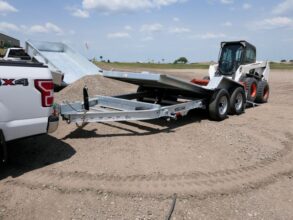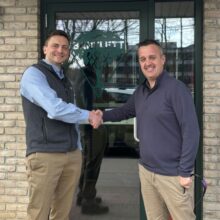Organic Lawn Care
By John Kmitta
Organic lawn care is a growing business segment, as more landscape industry professionals are looking to organic solutions to expand their market and grow their businesses.
“More and more people are looking at ‘going’ organic,” said Chris Lemcke, technical coordinator at Weed Man, a Canadian-based lawn care provider. “Offering an organic program will help you grow your business.”
According to William Torello, Ph.D., head of research and development at Converted Organics, a Boston-based producer of all-natural soil amendment and fertilizer products, there are multiple benefits to switching to an organic lawn care program. These include reducing negative environmental impacts; reducing or eliminating chemicals; increasing soil health by increasing the biological activity of soils, which allows for reduced fertilizer and water inputs; and longer-lasting and more positive results, which leads to significant economic savings.
“Using organics results in reduced water usage because the soil water-holding capacities and overall root systems will be increased,” he said. “Soil nutrient-holding capacities will also be greatly increased, allowing for much more efficient usage of fertilizers.”
Organic lawn care programs also allow landscape professionals to meet the needs of clients who are more aware of health and the environment, said Daniel Cote owner of Ecolawn, a Norton, Vt., provider of top dressing and compost-spreading equipment and services for the application of organic matter. By switching to organic lawn care services, landscapers are also complying with new environmental legislation, he added.
“Furthermore, ecological landscaping requires less maintenance,” said Cote. “We don’t need to use specific chemicals to get rid of a certain problem and another one for a different problem.”
Transitioning to an organic business model
“The most significant challenge is to be able to transition slowly over a two- to three-year period by decreasing synthetic inputs while increasing the use of organic materials and practices,” said Torello.
According to Torello, you also need to instruct your customers that a slight decrease in overall quality will occur during the first year of transition. Also, initial costs will be higher than synthetic. “But, over a three-year period, [costs] will ultimately be less than the current synthetic program,” he said.
The initial impact will be negative in that transitioning will cost more in terms of fertilizer, needed soil amendments, and organic weed/disease/insect control materials, said Torello. However, once the transitioning moves past the second year, a significant savings will occur since less fertilizer will be needed to maintain a high-quality turf growing on a biologically active and healthy soil.
“Other challenges are dealing with specific timing of certain organics and weather conditions that might apply when using them,” said Lemcke. “Also, getting customers to follow the specific instructions that may need to be done with the organic applications, like watering immediately after the application.”
But, according to Lemcke, the biggest challenge is changing the public’s perception of instant results.
“You need to change people’s mind set that a healthy lawn is a weed-free lawn,” said Lemcke. “The reality at this point in organic lawn care is that you won’t have a completely weed-free lawn, and customers need to be able to accept this. Those who make a conscious decision to get to organic lawn care over fear of using traditional pesticides are usually more likely to accept a less-than-perfect lawn.”
Lemcke also pointed out that organic products require more knowledge and understanding — both by the supplier and the customers. “You have to sift through a lot of info to get the right products.”
According to Lemcke, just because a product is organic does not mean that it is more environmentally friendly than a traditional product, and some organics can even be detrimental to the health of lawns. “This is why we rely on the U.S. and Canadian government institutions like the EPA and PMRA who employ hundreds of toxicologists to test and classify these products before we can use them,” said Lemcke.
Legal and political trends
Political impacts regarding organic lawn care can be significant depending upon the municipality, said Torello. “In general there is a widespread push to move toward organic, chemical-free management of public grounds,” he said. “There are a growing number of municipalities that already mandate organic programs, particularly near water sources and coastal areas.”
According to Cote, changes toward organic lawn care are coming gradually and in different ways. Some municipalities have regulations designed to protect water sources, natural parks, etc., while other municipalities are just beginning to limit or prohibit the use of certain products in certain areas such as day care centers, schools, etc.
“This is how it began in a lot of places,” said Cote. “For example, in Canada, the banning of pesticides began 10 years ago.”
Due to those bans, Weed Man, which is headquartered in Canada has had to change the way it does business, said Lemcke.
“In some places we can still do certain traditional or chemical applications, and in others we are faced with no choice but to use complete organic programs,” said Lemcke. “The problem with this is we do not have any new, better and cheaper organic products that are being brought to market as quickly as we need them.”
According to Lemcke, one of the issues in Canada is enforcing the unsupervised homeowner, especially if there is availability of traditional products anywhere, because the homeowner will continue to use, and sometimes abuse, the traditional products.
“If we can compete on a level playing field then we have a chance to make organics work and change the perception of a healthy lawn,” Lemcke said. “However, if cheating and wide-scale abuse happens — like what is happening in Quebec due to inadequate enforcement — then it become extremely difficult.”
Utilizing organic solutions
“Landscape professionals can better utilize organic solutions by taking physical and chemical soil analyses at least every three years to understand what and how much organic materials to incorporate,” said Torello.
He added that landscape professionals should make sure that all related practices enhance the use of organic inputs.
“Selecting, planting or overseeding the proper turfgrass species and varieties for a particular soil/climate area is critical,” Torello said. “Physical modifications that reduce compaction and thatch levels are also important, as is the proper use of irrigation water. Integrating all these practices will significantly enhance and speed up the transition toward an organic management program.”
Lemcke recommends using bridge products that include traditional products such as synthetic fertilizers with organic byproducts.
“This helps give you the best of both worlds by increasing the amount of N by using the synthetics, and soil benefits by using the organics,” said Lemcke. “Other ways are to offer things like organic top dressing to customers who may want to help increase the amount of organics or microbes in their lawn. There are many other organics that maybe offered as well to help supplement a traditional program.”
According to Cote, landscape professionals should start transitioning to organic lawn care in order to stay ahead of coming legislation — and also to stay ahead of the competition.
“From phosphorus bans in many states to rainy season regulation in Florida to the pesticide revolution in Canada that is creeping to the U.S., a lot of legislations are actually being put in place and more regulations are to come in every municipality,” said Cote. “I believe organic turf practices are just beginning and the organic turf business is not just a passing craze.”
Editor’s Note:
In the print edition of this article, William Torello’s affiliation was misidentified. It has been corrected in this online version. His full contact information is as follows:
William Torello, Ph.D.
Director, Research and Development
Converted Organics Inc.
137A Lewis Wharf
Boston, MA 02110
877-665-0444
www.ConvertedOrganics.com


